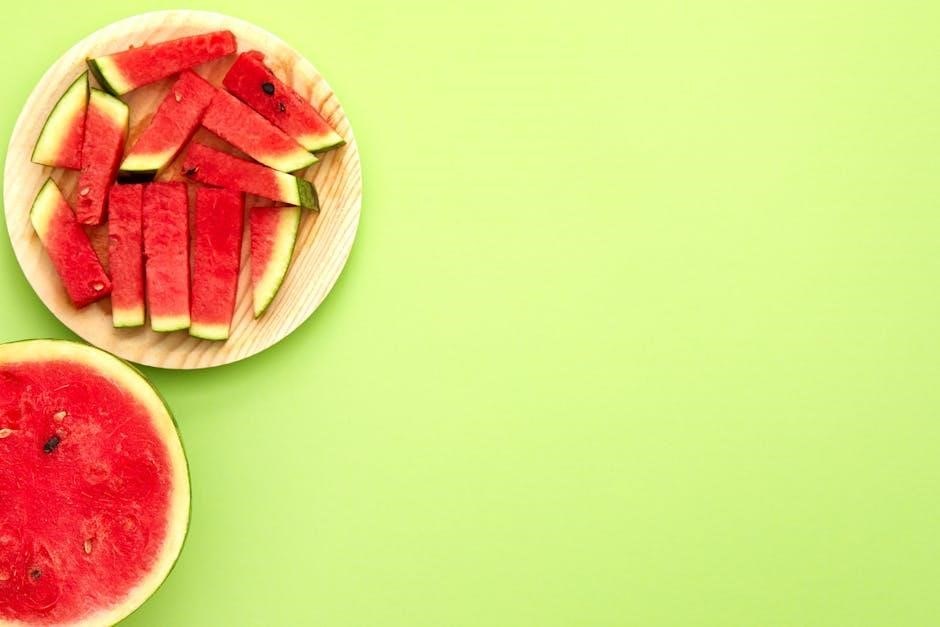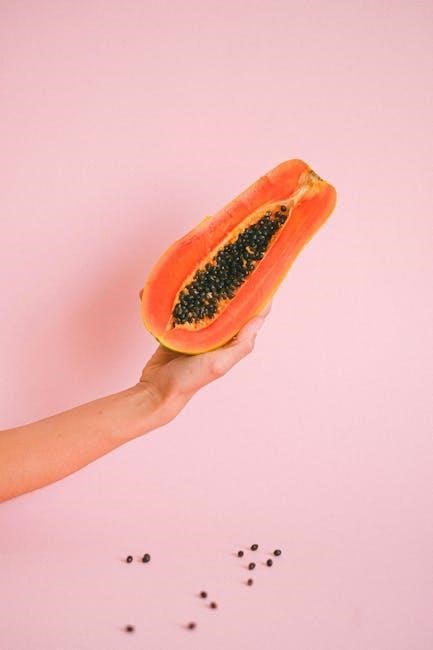A well-structured diet plan is essential for half marathon success, ensuring proper fueling, hydration, and recovery. This guide provides a comprehensive approach to nutrition, focusing on carbohydrates, hydration, and balanced meals to optimize performance and support overall health.
1.1 Understanding the Importance of Nutrition in Half Marathon Training
Nutrition plays a critical role in half marathon training, serving as the cornerstone for energy, recovery, and performance. A balanced diet ensures proper fueling, supports muscle repair, and enhances endurance. Strategic eating habits help runners avoid fatigue and injuries, making nutrition a key component of a successful training regimen. Properly timed meals and hydration are essential for optimal results.
1.2 Key Objectives of a Half Marathon Diet Plan
The primary goals of a half marathon diet plan include optimizing energy levels, ensuring proper hydration, and supporting muscle recovery. The plan aims to balance carbohydrates, protein, and healthy fats to sustain performance. It also focuses on preventing nutrition-related issues, such as energy crashes or digestive discomfort, while promoting overall health and endurance. Proper fueling strategies are tailored to individual needs and race demands.

The Foundation of a Half Marathon Diet
The foundation of a half marathon diet revolves around carbohydrates as the primary energy source and proper hydration to sustain performance and support overall bodily functions during training.
2.1 Carbohydrates: The Primary Energy Source
Carbohydrates are the cornerstone of a half marathon diet, providing essential energy for training and races. They should make up 45-55% of your daily calories, sourced from whole grains, fruits, and vegetables. These foods supply glycogen, which fuels your runs, and promote sustained endurance. Proper carb intake ensures your body is prepared for the demands of training and competition, preventing fatigue and enhancing performance.
2.2 Hydration Strategies for Optimal Performance
Proper hydration is crucial for endurance and recovery in half marathon training. Aim to drink water or electrolyte-rich beverages regularly, ensuring a balance between fluids and electrolytes to prevent dehydration and maintain performance. Incorporate natural sources like coconut water or bananas for electrolytes. Plan your hydration intake before, during, and after runs to stay optimally fueled and avoid fatigue or dizziness during training or races.

Pre-Run Nutrition

Focus on high-carb, low-fat meals 2-4 hours before running to optimize energy levels; Include easily digestible foods like oatmeal, bananas, or whole-grain toast to fuel your runs effectively.
3.1 Meal Planning 2-4 Hours Before Running
Plan meals rich in complex carbs, moderate protein, and low fat 2-4 hours before running. Examples include oatmeal with fruit, whole-grain toast with avocado, or quinoa salads. Avoid heavy, high-fiber foods to prevent digestive discomfort. Opt for foods high in easily digestible carbs to maintain energy levels and support performance during your run.
3.2 Snack Options for Quick Energy
Opt for easy-to-digest snacks like bananas, energy gels, or applesauce pouches for quick energy. These provide a rapid boost without discomfort, perfect for pre-run fueling. They offer essential carbs to sustain performance and are easy to carry during runs for convenient access when needed, ensuring you maintain energy levels throughout your training and races.

Race-Day Nutrition
A high-carbohydrate, low-fat breakfast 2-4 hours before the race is ideal for energy. Mid-race fueling with gels or electrolyte drinks helps maintain stamina and hydration levels.
4.1 The Ideal Breakfast for Race Morning
On race morning, opt for a high-carbohydrate, low-fat breakfast 2-4 hours before start time. Choose easily digestible foods like oatmeal, whole-grain toast, or a banana. Pair with a source of protein, such as eggs or Greek yogurt, for sustained energy. Avoid heavy or unfamiliar foods to prevent digestive discomfort during the race.
4.2 Fueling During the Race
During the race, aim to consume 30-60 grams of carbohydrates per hour, starting 20-30 minutes after the start. Opt for easily digestible options like energy gels, bananas, or sports drinks. Maintain a 4:1 carbohydrate-to-protein ratio for optimal energy. Stay hydrated by sipping water or electrolyte-rich beverages regularly to prevent cramps and maintain performance levels throughout the race.
Post-Run Recovery Nutrition
Post-run recovery requires replenishing glycogen stores and repairing muscles. Consume a mix of carbohydrates and protein within 30 minutes of finishing, such as chocolate milk or a recovery shake.
5.1 Refueling After the Race
Refueling after the race is crucial for recovery. Aim to consume a mix of carbohydrates and protein within 30 minutes to replenish glycogen stores and repair muscles. Opt for foods like chocolate milk, bananas, or a recovery shake. These options provide essential nutrients to reduce muscle soreness and restore energy levels, helping your body recover efficiently after the intense effort of the half marathon.
5.2 Importance of Protein and Electrolytes
muscle repair and recovery, while electrolytes replenish lost salts, maintaining proper hydration. Include lean sources like poultry, fish, or legumes for protein, and opt for electrolyte-rich foods such as bananas or dates. Sports drinks can also help restore electrolyte balance, ensuring optimal recovery and hydration post-race. Balancing these nutrients supports muscle function and overall performance, essential for a successful half marathon recovery.

Meal Planning and Preparation
Plan balanced meals rich in complex carbs, lean proteins, and healthy fats. Examples include whole-grain toast with avocado and eggs for breakfast, and quinoa salads for lunch, ensuring sustained energy and proper nutrition for training and recovery.
6.1 Sample Meals for Training Days
Breakfast: Overnight oats with fruit or whole-grain toast with avocado and eggs.
Lunch: Quinoa salad with lean protein and vegetables.
Dinner: Grilled chicken or fish with sweet potatoes and steamed greens.
Snacks: Bananas with peanut butter or mixed nuts.
These meals provide balanced nutrition, ensuring sustained energy for training and recovery.
6.2 Preparing Nutritious Snacks
Opt for snacks rich in carbohydrates and protein for quick energy. Examples include bananas with peanut butter, energy balls made with oats and nuts, or Greek yogurt with honey. Prepare small portions to avoid overeating and store them in airtight containers for convenience. These snacks support training without causing digestive discomfort, keeping you fueled and ready for your next run.

The Role of Protein and Fats
Protein aids in muscle repair and recovery, while healthy fats provide sustained energy. Include lean sources like poultry, fish, and nuts to balance your diet effectively.
7.1 Lean Protein Sources for Muscle Repair
Lean proteins like poultry, fish, eggs, and low-fat dairy are essential for muscle repair and recovery. Include plant-based options such as beans, lentils, and soy for variety. These sources provide amino acids necessary for tissue repair, helping runners bounce back stronger after intense training sessions. Aim to consume protein-rich meals or snacks within 30 minutes post-run for optimal recovery benefits.
7.2 Healthy Fats for Sustained Energy
Healthy fats are crucial for sustained energy and overall health. Include sources like avocados, nuts, seeds, and olive oil in your diet. These fats support heart health and provide essential calories without causing blood sugar spikes. Aim to incorporate them in moderation as part of balanced meals to maintain energy levels throughout your training and race day.

Avoiding Common Nutritional Mistakes
Avoid overeating before races and neglecting hydration. Stick to balanced, carb-rich meals and avoid last-minute diet changes. Proper fueling ensures optimal performance and prevents energy crashes.
8.1 Overeating Before the Race
Avoid consuming heavy, high-fat, or high-fiber meals close to race time, as they can cause digestive discomfort. Stick to light, balanced meals rich in carbohydrates and low in fat, such as whole-grain toast with avocado or oatmeal with fruit; Eating too much can lead to bloating, cramps, and energy crashes, hindering performance. Opt for familiar, easily digestible foods and stay hydrated to maintain comfort and energy levels during the race.
8.2 Neglecting Hydration
Proper hydration is critical for performance and health. Neglecting to drink enough water or electrolyte-rich fluids can lead to dehydration, causing fatigue, dizziness, and poor race results. Aim to drink water or sports drinks regularly, especially during long runs. Overhydration should also be avoided to prevent hyponatremia. Stay consistent with hydration habits to maintain energy levels and support overall performance during training and the race.
Electrolytes and Sports Drinks
Electrolytes are crucial for maintaining fluid balance and preventing muscle cramps. Sports drinks replenish sodium and potassium, especially during long runs. Use them when sweating heavily or running over 60 minutes for optimal hydration and performance. Natural sources like bananas and dates can also help replenish electrolytes post-run.
9.1 When to Use Sports Drinks
Sports drinks are ideal for long runs exceeding 60 minutes or during high-intensity training. They replenish electrolytes like sodium and potassium, lost through sweat, preventing muscle cramps. Use them when sweating heavily or in hot conditions to maintain hydration and energy levels. Avoid relying on them for short runs; water is sufficient for shorter distances. Balanced electrolyte intake is key for optimal performance and recovery.
9.2 Natural Electrolyte-Rich Foods
Natural electrolyte-rich foods like bananas, avocados, nuts, and seeds are excellent for replenishing lost salts. Coconut water and dates are also great sources of potassium and magnesium. Incorporating these foods into your diet helps maintain hydration and supports muscle function during long runs. They are ideal for post-run recovery and can be easily added to meals or snacks for sustained energy and electrolyte balance.

Final Tips for a Successful Half Marathon Diet
Stay consistent with your nutrition plan and listen to your body. Adjust your diet based on personal needs and race conditions to optimize performance and recovery.
10.1 Staying Consistent with Your Plan
Consistency is key to a successful half marathon diet. Stick to your nutrition plan throughout training to build endurance and adapt your body to race-day fueling. Monitor your food intake and hydration levels regularly. Adjustments should be minimal and based on performance feedback. Avoid experimenting close to race day to ensure optimal results and minimize digestive discomfort during the event.
10.2 Adjusting Based on Personal Needs
Your half marathon diet plan should be tailored to your body’s unique needs. Pay attention to how your body responds to different foods and hydration levels. Adjust portion sizes, food choices, and timing based on your energy levels, digestive comfort, and training performance. Everyone’s nutritional needs vary, so experimentation and personalized tweaks are essential for achieving peak performance and overall well-being during training and on race day.
